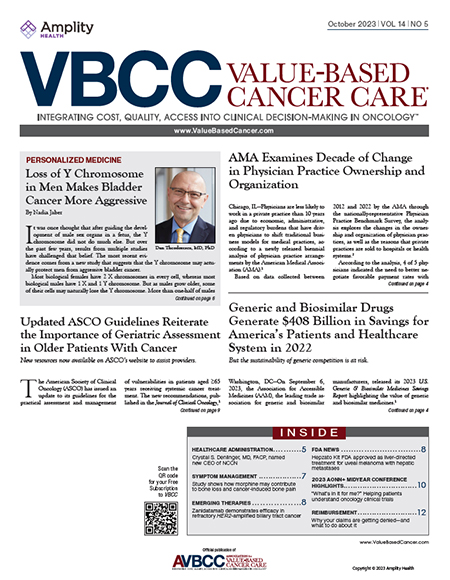As one of the largest operational oncology value-based payment models, the Medicare Oncology Care Model (OCM) has been a driving force in the shift from volume to value in cancer care. In the December 3 session of the Association for Value-Based Cancer Care (AVBCC) 10th Annual Summit, industry leaders discussed the successes, challenges, and future of OCM.
Pamela Pelizzari, MPH, Principal and Healthcare Consultant at Milliman, who moderated this discussion, began by addressing the challenges of OCM.
Ray Page, DO, PhD, FASCO, FACOI, President of the Center for Cancer and Blood Disorders, Texas–OCM Practice, said that OCM allowed him to look through a different lens to enhance and improve performance measures at his practice. One big challenge Dr Page said he faces is the management of data, which requires a tremendous amount of resources.
Blase Polite, MD, MPP, FASCO, Associate Professor of Medicine at the University of Chicago, said there has not been an opportunity to take advantage of the savings of OCM because of drug pricing. Dr Polite shared that drugs make up 60% of the current total cost of care. He predicts that by the year 2030, 90% of the total cost of care will be drugs. Drugs are overpowering the model, and it is out of proportion of what is needed in patient care.
Wendy Andrews, Practice Administrator of Oncology at the University of Arizona Cancer Center, agreed that the cost of drugs is a challenge. Ms Andrews also believes that OCM may need to partner with another model to prioritize screenings. In terms of quality care, cancer care should start at screenings to ensure more early-stage diagnoses and avoid the late-stage diagnoses often seen in disparate populations.
Lara Strawbridge, MPH, Director of the Division of Ambulatory Payment Models at the Center for Medicare and Medicaid Innovation, discussed the successes of OCM. Ms Strawbridge said that she has seen many valuable partnerships and conversations occur that will improve future models. Palliative care has also improved, keeping more patients out of the emergency department. Despite the difficulties of managing data, there is more data being used now more than ever, which will be beneficial. There are also more centers that are willing to take on downside risk.
While Ms Strawbridge sees an improvement in care with OCM, there has not been improvement in evaluation results. Although there has been a lot of hard work implemented around OCM, there is currently no measurable impact.
Panelists also discussed future models and what OCM should keep or replace and how the COVID-19 pandemic has affected these models.
Gain access to these in-depth, expert views on the future of value-based analytics in oncology practices when you register for the AVBCC Summit!


